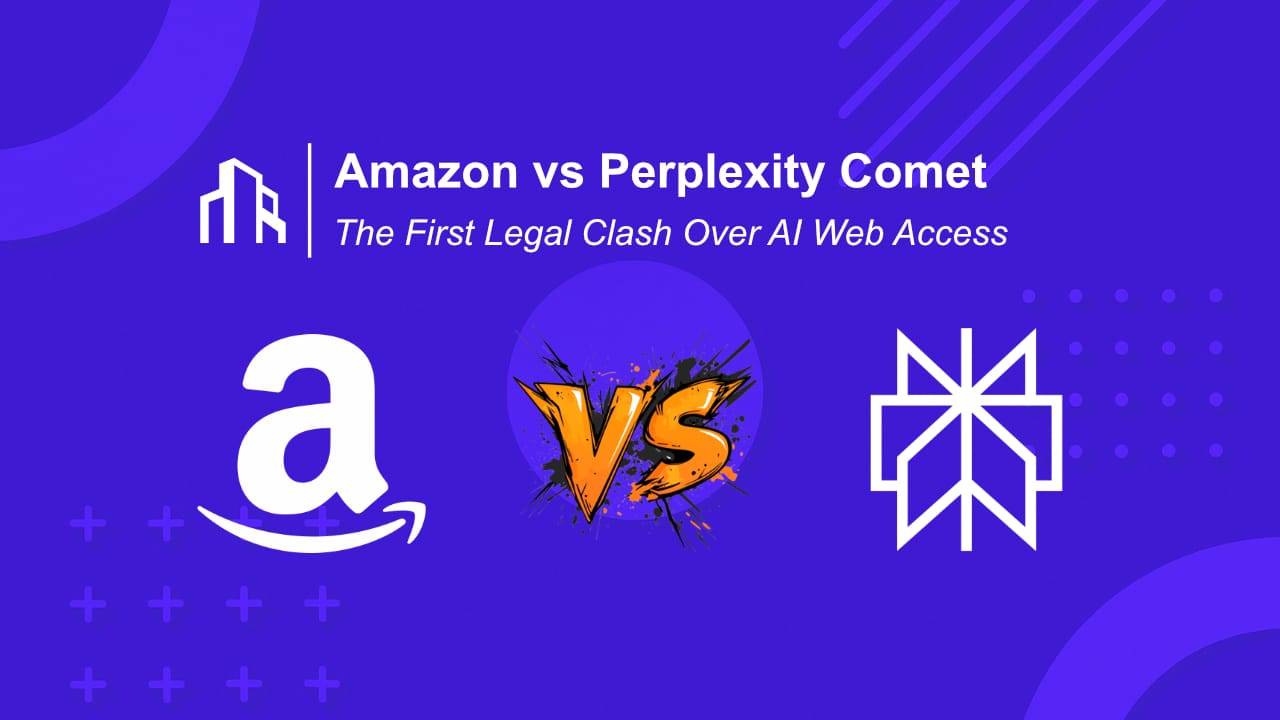Amazon vs Perplexity Comet: The First Legal Clash Over AI Web Access
Amazon is enforcing platform rules against Perplexity’s Comet AI assistant, raising major questions about open web access, AI agents and platform control.

A public tension is emerging between Amazon and Perplexity over the way Comet, Perplexity’s new AI assistant, accesses Amazon’s platform. What looks like a dispute over scraping is already turning into a much bigger signal about the future of AI agents, web access and platform governance.
This is the first visible case where a major tech platform pushes back against an AI assistant that behaves like a browser user rather than a traditional API consumer. It will not be the last.
What triggered the conflict?
Perplexity launched Comet as a standalone desktop AI assistant capable of browsing the web on behalf of the user. Comet mimics real browser behaviour, fetches content and can interact with websites dynamically. That includes Amazon pages.
Amazon responded by stating that Perplexity’s access is not authorised and may violate Amazon’s terms of service. In other words:
Perplexity claims Comet is a browser replacement.
Amazon claims Comet is a bot acting without permission.
The core issue is not scraping. It is identity.
Is an AI agent acting on behalf of a human user allowed to browse the web the same way that user would
Timeline of events
- Perplexity releases Comet with autonomous browsing capabilities
- Users notice it can pull real-time data from Amazon product pages
- Amazon signals that this traffic is unauthorised under its platform rules
- Legal and policy discussions begin around agent-based access
- Debate spills into the AI community: who controls the interface between AI and the web
Why this matters beyond Perplexity
This is not a Perplexity problem. This is the future of the web being negotiated in real time.
If platforms can block AI agents from accessing public pages, then:
- The open web becomes selectively closed
- Browser-based AI assistants lose core functionality
- The future of autonomous agents depends on private API deals, not public access
- Search is no longer the only gatekeeper, the platform becomes the gatekeeper
If Amazon can do this, others will follow. That includes LinkedIn, Meta, Shopify and even news publishers.
The strategic question for businesses
Do you want a future where every AI agent needs private licensing to read your website
Or a future where users choose the interface but the content stays open
Right now the legal layer is not ready for autonomous AI browsing. Most ToS agreements were written for web scrapers and automated crawlers, not agents acting on behalf of authenticated human users.
The Comet case will force a rewrite of those rules.
For AI builders and founders
- Any commercial AI agent that browses the web is now exposed to platform enforcement
- Terms of service will evolve into machine-readable access control
- API-only models will become more common, but also more restrictive
- Governance and audit logs will shift from optional to mandatory
- Browser simulation as a technique will face legal and technical pushback
If your product depends on autonomous navigation of the public web, treat this story as a warning shot.
For enterprises adopting AI agents
This conflict highlights three immediate risks:
- Dependency risk
Your agent may work today and break tomorrow if a platform blocks access. - Compliance risk
If an AI tool violates terms of service, the liability is not always on the vendor. It can fall on the business using it. - Governance risk
If your agent touches customer or product data while bypassing official APIs, you lose auditability and contract protection.
This is why every serious AI deployment now needs an internal policy for agent access, browser sessions and platform terms.
The bigger picture
Tech giants are deciding whether AI agents should have the same rights as human users. If they say no, the open web turns into a permission-only ecosystem. That would reshape everything from ecommerce to research to workflow automation.
The outcome of Amazon vs Perplexity Comet will not just define what one assistant can do. It will define whether the next generation of AI interfaces is open, semi-open or fully controlled.
Scalevise will follow this closely because it affects every AI agent strategy we build for clients.
Book a call
Want to discuss how this shift affects your AI roadmap and agent architecture
Schedule a call and get a practical strategy for compliant, high-impact automation.
